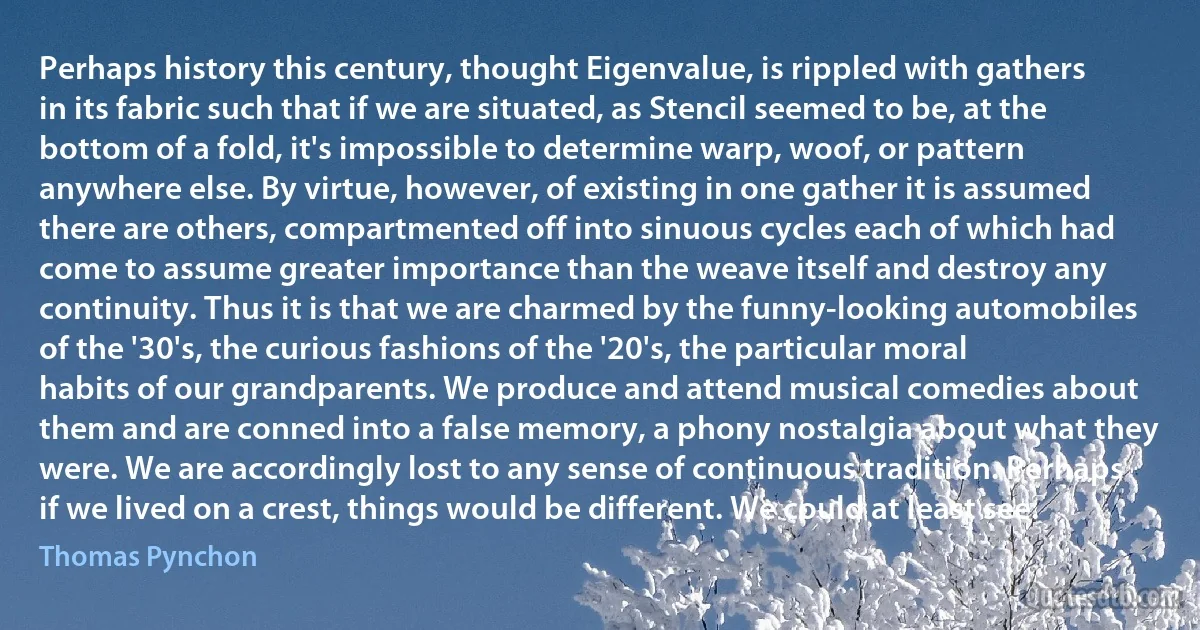
Perhaps history this century, thought Eigenvalue, is rippled with gathers in its fabric such that if we are situated, as Stencil seemed to be, at the bottom of a fold, it's impossible to determine warp, woof, or pattern anywhere else. By virtue, however, of existing in one gather it is assumed there are others, compartmented off into sinuous cycles each of which had come to assume greater importance than the weave itself and destroy any continuity. Thus it is that we are charmed by the funny-looking automobiles of the '30's, the curious fashions of the '20's, the particular moral habits of our grandparents. We produce and attend musical comedies about them and are conned into a false memory, a phony nostalgia about what they were. We are accordingly lost to any sense of continuous tradition. Perhaps if we lived on a crest, things would be different. We could at least see.
Thomas PynchonRelated topics
bottom century continuity crest different false gather history impossible least lost memory nostalgia off perhaps produce see sense thought thus virtue weave woof others phony thingsRelated quotes
Development means a capacity for self-sustaining growth. It means that an economy must register advances which in turn will promote further progress. The loss of industry and skill in Africa was extremely small, if we measure it from the viewpoint of modern scientific achievements or even by standards of England in the late eighteenth century. However, it must be borne in mind that to be held back at one stage means that it is impossible to go on to a further stage. When a person was forced to leave school after only two years of primary school education, it is no reflection on him that he is academically and intellectually less developed than someone who had the opportunity to be schooled right through to university level. What Africa experienced in the early centuries of trade was precisely a loss of development opportunity, and this is of the greatest importance.

Walter Rodney
Whenever this effect shall be produced among us; whenever the vicious portion of [our] population shall be permitted to gather in bands of hundreds and thousands, and burn churches, ravage and rob provision stores, throw printing-presses into rivers, shoot editors, and hang and burn obnoxious persons at pleasure and with impunity, depend upon it, this government cannot last. By such things the feelings of the best citizens will become more or less alienated from it, and thus it will be left without friends, or with too few, and those few too weak to make their friendship effectual. At such a time, and under such circumstances, men of sufficient talent and ambition will not be wanting to seize the opportunity, strike the blow, and overturn that fair fabric which for the last half century has been the fondest hope of the lovers of freedom throughout the world.

Abraham Lincoln
I shall present a theory - which I call "the theory of the managerial revolution." During the past century, dozens, perhaps even hundreds, of "theories of history" have been elaborated. All of the theories, with the exception of those few which approximate to the theory of the managerial revolution, boil down to two and only two. The first of these predicts that capitalism will continue for an indefinite, but long, time, if not forever:' that is, that the major institutions of capitalist society, or at least most of them, will not be radically changed. The second predicts that capitalist society will be replaced by socialist society. The theory of the managerial revolution predicts that capitalist society will be replaced by "managerial society," that, in fact, the transition from capitalist society to managerial society is already well under way.

James Burnham
Today there is a new class hostile to business in general, and especially to large corporations. As a group, you find them mainly in the very large and growing public sector and in the media. They share a disinterest in personal wealth, a dislike for the free-market economy, and a conviction that society may best be improved through greater governmental participation in the country's economic life. They are the media. They are the educational system. Their dislike for the free-market economy originates in their inability to exercise much influence over it so as to produce change. In its place they would prefer a system in which there is a very large political component. This is because the new class has a great deal of influence in politics. Thus, through politics, they can exercise a direct and immediate influence on the shape of our society and the direction of national affairs.

Irving Kristol
Now the Disney Corporation could do this because that culture lived in a commons, an intellectual commons, a cultural commons, where people could freely take and build. It was a lawyer-free zone.
It was culture, which you didn't need the permission of someone else to take and build upon. That was the character of creativity at the birth of the last century. It was built upon a constitutional requirement that protection be for limited times, and it was originally limited. Fourteen years, if the author lived, then 28, then in 1831 it went to 42, then in 1909 it went to 56, and then magically, starting in 1962, look - no hands, the term expands.
Eleven times in the last 40 years it has been extended for existing works - not just for new works that are going to be created, but existing works. The most recent is the Sonny Bono copyright term extension act.

Lawrence Lessig
